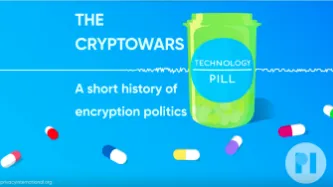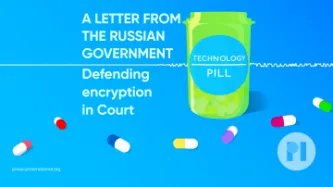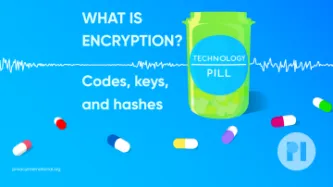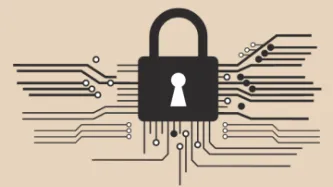Search
Content type: Report
First published in 2017, PI’s Guide to International Law and Surveillance is an attempt to collate relevant excerpts from these judgments and reports into a single principled guide that will be regularly updated. This is the fourth edition of the Guide. It has been updated it to reflect the most relevant legal developments until March 2024.The Guide aspires to be a handy reference tool for anyone engaging in campaigning, advocacy, and scholarly research, on these issues. The fourth…
Content type: Advocacy
While PI recognises the threats posed by cybercrime, PI reiterates the need both for a narrow scope for the proposed Convention, focusing solely on core cyber-dependent crimes, as well as for effective safeguards throughout the entire treaty to ensure human rights are respected and protected, especially in the areas of privacy and freedom of expression. Throughout the negotiations most of proposals by Member States and other stakeholders aimed at restricting the scope of the treaty and…
Content type: Video
Links - Read more about PI's work on encryption- Matt Blaze and crypto.com; you can now find Matt at mattblaze.org - More about ITAR and the export of cryptography- More about France's ban on encryption ending in this 1999 article from the Register- More about the Data Encryption Standard - Find out more about the Clipper Chip or take a look at this NY Times article from 1994 (paywalled)- Matt Blaze's flaw in the Clipper Chip- NSA Data Center and NSA holding data- An…
Content type: Video
The case dealt with a Russian law obliging telecommunications service providers to indiscriminately retain content and communications data for certain time periods, as well as a 2017 disclosure order by the Russian Federal Security Service requiring Telegram Messenger company to disclose technical information which would facilitate “the decoding of communications”.Links:PI case pageECtHR judgment in the Podchasov casePI's work on encryptionPI's report on End-to-End Encryption (E2EE)More…
Content type: Video
LinksFind out more about encryption:Computerphile on YouTube is a computer science professor with a range of useful and accessible videos on encryptionCloudflare have a helpful learning centre including this article on how encryption works and why cloudflare use Lava lamps to generate keysThis is a helpful article on Diffie-Hellman including a diagram of the colours demonstration, which Ed discusses during the podcastThis article is great for learning more about hashingAnd if you're interested…
Content type: Advocacy
Privacy International had suggested the Human Rights Committee consider the following recommendations for the UK government:Review and reform the IPA 2016 to ensure its compliance with Article 17 of the ICCPR, including by removing the powers of bulk surveillance;Abandon efforts to undermine the limited safeguards of the IPA 2016 through the proposed Investigatory Powers Amendment Bill;Refrain from taking any measures that undermine or limit the availability of encrypted communications or other…
Content type: Advocacy
BackgroundThe Snowden revelations and subsequent litigation have repeatedly identified unlawful state surveillance by UK agencies. In response, the UK Parliament passed the highly controversial Investigatory Powers Act 2016 (IPA), which authorised massive, suspicionless surveillance on a scale never seen before, with insufficient safeguards or independent oversight.Privacy International led legal challenges to this mass surveillance regime both before and after the Act became law. The Act…
Content type: News & Analysis
Photo by Daniel Jensen on Unsplash
Everyone is talking about Facebook's end-to-end encryption plans and the US, UK and Australian government's response. Feeling lost? Here is what you need to know.
What's Facebook trying to do?
First let's be clear: Facebook has many faults when it comes to privacy. It's also suffered a number of security failures recently. See here for instance.
In response to their successive failures to protect your privacy, Facebook announced in their 'pivot to privacy…
Content type: News & Analysis
Today’s announcement regarding the UK and US agreement signed pursuant to the US CLOUD Act is being touted on both sides of the Atlantic as a major victory for law enforcement and security. But it is a step backward for privacy.
And it’s far more complicated than their press release and letter to industry.
The agreement replaces the prior system, under which law enforcement agencies from around the world, including the UK, had to meet US legal standards in order to get access to content held…
Content type: News & Analysis
Privacy International has joined a global coalition of privacy campaigners, tech companies, and technology experts to respond to proposals by British intelligence chiefs aimed at allowing them access to encrypted messaging apps such as WhatsApp or Signal.
If implemented, the proposals would allow government authorities to force messaging platforms to silently add a law enforcement participant to a group chat or call.
Such a capability poses serious threats to…
Content type: Examples
In February 2019 Google engineers announced that they had created faster, more efficient encryption system that could function on less-expensive Android phones that were too low-powered to implement existing full-device encryption. The scheme, known as Adiantum, uses established and well-vetted encryption tools and principles. Android has required smartphones to support encryption since 2015's version 6, but low-end devices were exempt because of the performance hit. It will now be up to device…











